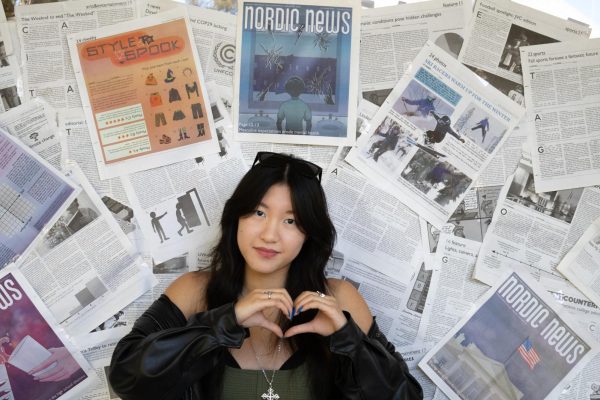Growing up in a world surrounded by technology, a new generation of activists and future politicians tackle conflicts in unique ways. Modern activists utilize social media to spread awareness, and more opportunities for teens to get involved are constantly being created. In schools, youth activists work alongside their institutions to channel their passion.
Junior Yameena Shameem (she/her) is the co-president of the Muslim Student Association. She also participates in her mosque’s youth group, which has organized fundraisers for natural disasters in Pakistan and Turkey. Shameem has been involved in activism her entire life. The first protest she remembers attending was in support of Palestine, when she was three years old and living in Norway.
“I’m especially really passionate about the Palestinian Liberation Movement, and that’s something that I’ve been passionate about ever since I was younger. My entire family has really gotten me into that, and we’ve all supported Palestine as long as I can remember,” Shameem said.
Shameem credits her family for her interest in activism. The protest they attended in Norway received a large amount of backlash due to the issue’s controversy. However, Shameem remains motivated by the way her family continues to stand up for their beliefs. Her mother, in particular, has largely inspired Shameem’s activism.
“She always told me to advocate for myself and advocate for other people. If a group cannot stand up for themselves, it’s your job to stand up for them. That’s what she’s always told me,” Shameem said.
Similarly, senior Ash Haddad (they/he) is involved with social justice, primarily spreading awareness about the difficulties minority groups face. After Black Lives Matter protests in 2020 swept across the US, Haddad decided they wanted to educate themselves more about people who have been systematically discriminated against and work to advocate for them.
“Because I am marginalized in society, I understand some of the struggles that other people like me have experienced, and I want to be able to be a voice for people,” Haddad said. “I want to be able to do my job in making sure that people can feel safe.”
Spurred by the recent war in Gaza, the MSA, Black Student Union and South Asian Student Association organized a walkout on Nov. 16 in demand of a ceasefire. The district can’t approve walkouts, preventing students from using school megaphones. Shameem says she is proud of the outcome of the event.
“It was very empowering, and it was a very good thing for us to do to show our support for Palestine because it’s not really spoken about in schools, which is really hurtful and it’s horrible. It needs to be talked about,” Shameem said.
Due to the fact that walkouts cannot be approved by administrators or the district, students may be marked absent if they walkout in protest. The Student Board Policy No. 3220 which was revised on Jan. 23 on Freedom of Expression encourages students to voice their opinions as long as it does not “substantially disrupt the operation of the school.” Shameem said Inglemoor upholds their right to protest.
“I think Desautels is very open to activism, and he’s very supportive of everyone’s opinions, which is really important because you don’t want to be constrained in a school. It’s our right to be able to express ourselves openly and freely,” Shameem said.
Haddad agrees that the school supports student-led initiatives, although he is concerned that the school isn’t involved in social justice itself. He also said that the support administrators give may not transfer to the rest of the staff.
“Inglemoor does somewhat of a good job. Definitely when we have walkouts, Inglemoor seems to be okay with it,” Haddad said. “I won’t necessarily say everyone in Inglemoor supports it. A lot of people will assume that activism causes trouble, but sometimes causing trouble is good.”
In an effort to involve the school in more social justice, Haddad served on a Northshore-led group of students and staff for two years that discussed implementing more diverse studies in the district’s curriculum. Although an Ethnic Studies course is offered, they said that a more varied curriculum should be taught in all classes to acknowledge what marginalized groups have gone through.
“Sometimes it’s very hard to hear about the stuff in our history, but I think it’s important to be uncomfortable, because it allows our brains to open up to the idea that something like this happened,” Haddad said.
Senior Leah Yoon (she/her) directs her activism towards environmental awareness, an issue she has been passionate about since middle school. She is a part of local conservation organization Whale Scouts, dedicated to habitat restoration and community outreach on the effects of climate change. With them, she replanted native plants along a river in the Wayne Golf Course in Bothell, providing both shade and nutrition for the salmon that live there.
“After the city bought the golf course, we’re trying to turn it into a forested place instead of just being grass, so we’re doing work there,” Yoon said.
Yoon is also a member of Earth Corps, which hosts schoolwide campus cleanups and has led to the re-institution of metal utensils in the cafeteria. However, she thinks that some students who attend campus cleanups don’t really care about the environment and just show up for volunteer hours.
“It’s a good incentive to give hours, but at the same time, you’re just doing it for the hours,” Yoon said. “I think we’re okay but can definitely be better.”
Yoon says her goal is to make an impact in the community, whether directly or indirectly. As she graduates from high school this year, she plans to take her passion for environmental activism with her to university, and turn it into something bigger.
“I want to meet other people who are also activists, share what we know,” Yoon said. “I want to go into environmental studies and want to learn more about the law side of it, the data science part of it — all the sides of it, that can help with my activism.”











